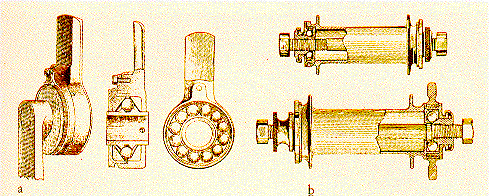| |
Low friction
bearings were essential to the development of a low-loss power train
for the bicycle. The quantities required for this first venture into individual
human-powered mobility demanded the standardization associated with mass
production. The (a) diagram shows balls running in V-grooves for pedal bearings.
Adjustment for this system is achieved by pulling the two halves of the
race together. The wheel hubs shown in (b) use the cup-cone configuration which
also is self aligning. Adjustment of the bearing is through tightening
the clearance between the cones and the cups. These systems were manufactured
in Birmingham, UK, in about 1880. |
|
